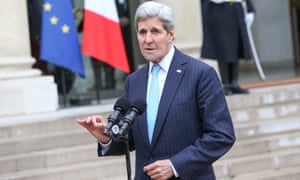Ian Black
Middle East editor
Link
The US secretary of state, John Kerry, has given an upbeat assessment of prospects for diplomatic efforts to end the war in Syria and fight Islamic State, saying a ceasefire between Bashar al-Assad and the rebels fighting to overthrow him could now be just weeks away.
Kerry told reporters in Paris that Saturday’s agreement in Vienna for a ceasefire and talks between the Syrian government and opposition would boost the international campaign against Isis, galvanised by the atrocities in the French capital.
“That’s a gigantic step,” Kerry said. “If we can get that done, that opens up the aperture for a whole bunch of things. We’re weeks away conceivably from the possibility of a big transition for Syria, and I don’t think enough people necessarily notice that. But that’s the reality.”
The US is seeking to build on the momentum of the Vienna agreement, in which 19 countries, including bitter rivals Iran and Saudi Arabia, signed a UN statementsupporting a 1 January deadline for the start of talks between Assad and the rebels, with the aim of agreeing a ceasefire by 14 May 2016 and holding free elections a year later.
No Syrians were invited to take part in the event so that the international parties could present a unified message.
Crucially, however, there was no sign of agreement on the polarising question of Assad’s future. The US, Britain and other western countries have signalled that the president could stay on for a transitional period but then must go. Russia has insisted that must be for the Syrian people to decide. Iran’s view is that Assad must be able to participate in future elections.
Jordan has been mandated to draw up a list of anti-Assad groups that could take part in negotiations. That will exclude Isis and Jabhat al-Nusra, al-Qaida’s Syrian affiliate, which are banned by the UN. Both could be attacked even when a broader ceasefire is in place, the statement said.
Saudi Arabia is expected to host a meeting of Syrian opposition figures by mid-December, at which they are to agree on a delegation to send to talks with representatives from Assad’s government. Once talks begin, a ceasefire is to take effect.
Several rebel groups linked to Turkey, Saudi Arabia or other Gulf states have furthermore cooperated with Jabhat al-Nusra and are unlikely to be prepared to turn against it. Representation for Kurdish groups is another potential difficulty.But even the mainstream, western-backed opposition, the Syrian National Coalition, will be unwilling to take part without guarantees that Assad will go. Opposition sources say they also fear the Jordanian vetting process will exclude the majority of armed rebel groups and certainly important non-jihadi Islamist ones like Ahrar al-Sham, and thus play into Assad’s hands.
In the wake of Friday’s attacks the US, Britain and France have all said they want to accelerate a twin-track approach to Syria, intensifying diplomacy and escalating military action against Isis. Last week’s capture of the Iraqi town of Sinjar by US-backed Kurdish forces is being held up as a model for future operations.
“Out of this event in Paris will come an even greater level of vigilance and cooperation in some places that may have been a little bit less concerned about things hitting them in certain parts of the world,” Kerry predicted.
“My sense is everybody understands that with Lebanon’s attacks, with what’s happened in Egypt, with Ankara, Turkey and attacks in Paris, we have to step up our efforts to hit them at the core where they’re planning these things and also obviously to do more on borders in terms of the movement of people,” he said


No comments:
Post a Comment